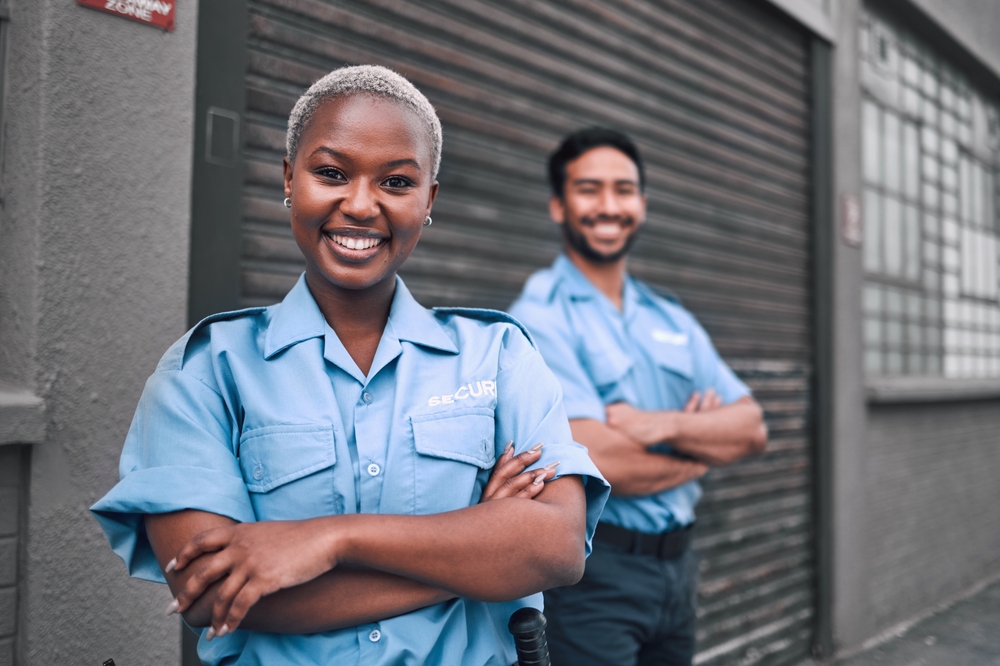
In today’s ever-evolving security industry, security guards play a pivotal role in maintaining safety. With new challenges arising, security guards need to continually develop their skills to remain competitive. A well-rounded security guard is an individual equipped with a broad, diverse skill set that allows them to protect both people and property effectively.
However, possessing these essential skills is not enough. To stay relevant in a growing market, security guards must focus on improving their skills regularly. From mastering conflict resolution to excelling in emergency response, security guards should explore the benefits of de-escalation training in security and law enforcement as part of their commitment to professional growth.
Here, we explore these essential security guard skills and how you can improve them to become a more effective security professional.
1. Communication Skills
Communication is at the heart of any security professional’s duties. Whether dealing with a tense situation or helping visitors, the ability to communicate clearly is critical. Security guards must be adept at both verbal and non-verbal communication.
Employing verbal de-escalation strategies and clear and concise verbal instructions are crucial when directing crowds or coordinating with law enforcement officials during emergencies. Additionally, non-verbal cues, such as body language, enable security guards to manage volatile situations effectively, preventing escalation while maintaining control.
When it comes to conflict resolution skills, the ability to communicate calmly and professionally can make a significant difference. Security guards often face heated or emotionally charged individuals, and their capacity to properly regulate emotions and de-escalate these potentially volatile situations using effective communication is essential to maintaining a safe and secure environment.
For example, a simple misunderstanding between two parties can be managed by a security guard trained in verbal de-escalation strategies.
How to Improve
One way to enhance a security guard’s communication skills is by participating in role-playing exercises. Practicing different scenarios—whether negotiating during a conflict or interacting with customers—can help sharpen these security officer skills.
Engaging in these exercises not only improves communication but also enhances conflict resolution skills, which are crucial when dealing with challenging situations. Participating in de-escalation security officer skills training alongside other security guards can provide additional perspectives and strategies, further improving effectiveness.

Courses focusing on verbal de-escalation techniques and customer service for a security guard can significantly boost these security officer skills and help guards handle real-world situations with confidence.
2. Observation and Surveillance
Keen observation and surveillance skills are at the core of a security guard’s ability to prevent security incidents before they occur. Security guards are often required to monitor vast areas or busy environments, which means that situational awareness is a crucial skill. Observing subtle changes in behavior or recognizing unusual patterns helps security personnel spot potential threats early.
In many environments, security guards also rely on technology such as CCTV. However, effective use of this surveillance technology requires more than just passively monitoring a screen. Knowing what to look for and how to interpret data from these tools significantly increases a guard’s ability to prevent or mitigate security breaches.
How to Improve
Regular training on security technology and CCTV systems can enhance your ability to monitor large areas efficiently. Additionally, practicing security guard skills, such as observational abilities, in different environments helps in quickly recognizing suspicious activities and potential threats.
3. Physical Fitness
While many see physical fitness as simply a requirement, it plays a critical role in a guard’s ability to respond to emergencies or challenges. A physically fit security guard can act swiftly, whether it is moving through a building to investigate an alarm or restraining an individual posing a threat. Without proper fitness, even the best-trained security professional may find themselves at a disadvantage in situations requiring quick, decisive actions.
Maintaining a high level of physical fitness is essential for security guards who may have to patrol large areas, stand for long periods, or intervene in physical altercations. Regular exercises help security guards stay sharp and alert.
How to Improve
Incorporating strength training, cardiovascular exercises, and flexibility routines into a daily regimen is crucial. By building stamina and agility, security guards can ensure they fulfill the physical demands of the job. Implementing a variety of workouts, such as running and bodyweight exercises, is an effective way to maintain and improve physical fitness.
4. First Aid & Emergency Response
First aid and emergency response skills are often what make a security guard stand out during a crisis. Security guards are typically the first on the scene when accidents or medical emergencies occur, so knowing how to provide immediate assistance can be the difference between life and death. From performing CPR to using an automated external defibrillator (AED), these skills ensure security professionals can respond effectively.
Moreover, security guards need to manage emergency situations with calm and precision. Whether it is handling a fire evacuation or providing immediate care to an injured individual, the guard’s ability to act quickly is crucial.
How to Improve
Security guards should regularly participate in first aid courses that cover a range of emergency responses, such as CPR, AED use, and wound care. Additionally, conflict resolution training for security is essential to equip guards with the skills needed to manage tense situations. Training for both emergency and conflict scenarios will prepare guards to handle crises confidently and efficiently.
5. Legal Knowledge
Understanding the laws governing the work of security officers is vital. A strong grasp of security protocols, local regulations, and the rights and responsibilities of security guards ensures that guards act within legal boundaries. Without this legal knowledge, a security guard risks inadvertently infringing on the rights of others or mishandling a situation in ways that could lead to legal consequences.
For instance, knowing how to approach a trespasser legally or when and how to detain someone are crucial aspects of the job. Regular updates on security procedures help guards remain compliant with laws and avoid liability.
How to Improve
Regular briefings and legal training workshops are essential for maintaining up-to-date knowledge of the law. Security guards should stay informed on new regulations, attend seminars, or even pursue certifications in security law.

6. Customer Service Skills
In many environments, security guards serve as the face of the establishment they protect. As such, strong customer service skills are an essential part of their role in protecting people. Whether greeting guests, providing directions, or managing a complaint, security guards must interact professionally and courteously with the public. They must also rely on critical thinking to assess and respond to unique situations as they arise.
A guard’s ability to provide excellent customer service can enhance the overall sense of safety for visitors and staff, especially when paired with knowledge of security procedures.
Being approachable while maintaining authority is an essential balance that every security professional should master. For example, when working in retail environments, security officers must ensure that both customers and staff feel protected without appearing overly strict or intimidating.
Familiarity with security technology and security procedures further strengthens a guard’s capability to safeguard people while exuding confidence and professionalism.
How to Improve
One effective way to build customer service skills is through training programs that focus on active listening and customer interaction. Practicing these security guard skills during everyday interactions will also help boost confidence and professionalism.
7. Conflict Resolution
In high-stress environments, a security guard often encounters situations where emotions run high. Conflict resolution is the process of managing disputes calmly and professionally, ensuring that issues are addressed before they escalate.
A security guard trained in conflict resolution can make a significant difference in maintaining safety and calmness during confrontations, projecting a reassuring presence that de-escalates tension. By leveraging good communication, security professionals are better equipped to resolve disputes effectively.
How to Improve
To enhance a security officer’s skills in conflict resolution, practical training in active listening and empathy is essential. Regular participation in workshops or role-playing exercises focused on high-stress scenarios helps develop good communication.
Taking advanced courses in emotional intelligence and conflict de-escalation techniques also strengthens these skills, ensuring that a security guard becomes a reliable and calming figure in challenging situations.
8. Problem-Solving Abilities
Problem-solving abilities are crucial for a security guard to navigate complex challenges effectively. Whether responding to emergency situations or handling unexpected disruptions, a security guard relies on quick thinking and analytical skills to ensure safety.
Security professionals often provide valuable insights that go beyond merely identifying issues, focusing on solutions that prevent problems from recurring. These problem-solving abilities are complemented by strong observational skills, which enable guards to detect unusual behaviors and preempt threats.
How to Improve
To build strong problem-solving abilities, security guards need exposure to diverse scenarios, including simulated emergency situations that require creative thinking and rapid decision-making. Engaging in hands-on activities that simulate real-life challenges, such as mock security drills, can also provide valuable insights into effective responses.
Additionally, learning from experienced officers and participating in critical thinking workshops hone these skills. The goal is for a security officer to integrate both observational skills and solution-focused strategies into everyday practice, ensuring preparedness for any incident.
9. Integrity and Ethics
In security roles, a security guard serves as both a protector and a symbol of trust, which is why integrity and ethics are foundational. Guards who consistently act in an ethical manner foster respect and trust within the communities they serve. Upholding integrity ensures that security guards remain focused on protecting people and property without misusing their authority.
Moreover, demonstrating good communication skills allows guards to uphold transparency and respect, reinforcing public confidence in their conduct.
10. How to Improve
For a security officer to cultivate integrity and ethics, ongoing education in ethical decision-making is beneficial. Courses that emphasize real-life case studies and ethical dilemmas provide context for acting with integrity.
Security guards need to review codes of conduct regularly and participate in ethical training that explores accountability and personal responsibility. Mentorship programs with experienced security professionals are also useful, as they demonstrate how to handle complex situations in an ethical manner that builds public trust.
11. Technical Proficiency
In today’s digital age, a security guard requires a high level of technical proficiency to operate surveillance equipment, manage access control systems, and respond swiftly in emergency situations. A security guard needs to master various technologies, from surveillance software to electronic incident reporting.
By developing situational awareness, security officers can identify patterns of unusual behavior, enhancing their effectiveness in preventing incidents. This level of expertise also includes the ability to accurately document activities and incidents, which strengthens overall security operations.
How to Improve
Improving technical proficiency involves regular training on new and existing technologies. It is vital to learn to use advanced access control systems, such as biometric scanners and digital keypads. In addition, a security officer can enhance their observational skills by practicing surveillance equipment, such as closed-circuit cameras, to spot suspicious patterns.
Training sessions on effective record-keeping ensure that a security guard can accurately document incidents. Developing situational awareness through scenario-based training also prepares guards for real-world applications of their technical skills, creating a safer and more responsive security presence.
Strengthening Skills for a Safer Future
In a world where threats continue to evolve, the value of these essential skills for security guards cannot be overstated. From mastering communication skills and exercising active listening to enhancing physical fitness, these competencies are critical for creating a safe and secure environment.
At Peaceful Leaders Academy, we are committed to helping aspiring security guards and experienced professionals alike refine their security guard skills. We offer specialized courses to improve conflict resolution, emergency response, and much more.
Enroll today to strengthen your skills and become the effective security guard the industry demands.



